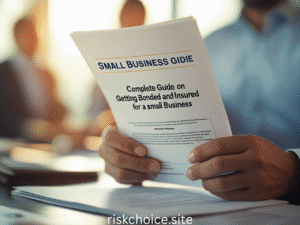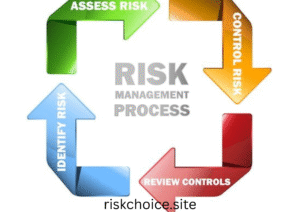
Launching a new business, you have most likely heard the terms bonded and insured used frequently. These are not just legal terms; rather, they are vital protections that establish client confidence, guard your company against financial loss, and even assist in contract negotiations. Still, what exactly does it mean to bond and insure? Its cost is how much? And how you approach it?
We will walk you through how to get bonded and insured for a small business in this tutorial, breaking it down in basic words so you may move forward legally and boldly.
“Bonded and Insured” means what?
One should know what each phrase denotes before delving into the procedure:
Bonded indicates that your company bought a surety bond. This kind of agreement shields customers in should your company fail to fulfill its responsibilities—that is, not finishing a work or generating financial loss.
On the other hand, insured covers your company against unanticipated events include mishaps, property damage, lawsuits, or staff injuries. It’s financial coverage that gets your company back on track following setbacks.
Clients, landlords, or even government contracts often call for your being bonded and insured. It projects to them your dependability, professionalism, and financial sensibility.
Why Do Small Businesses Need Insurance and Bonding?
Getting bonded and insured is a wise and usually required action for small enterprises for several compelling reasons.
Legal Requirements: To operate legally some states or businesses call for particular insurance or bonds.
Bonding and insurance guarantees to clients that you are trustworthy and legal.
It guards your assets should something go wrong.
Many consumers and corporate clients only choose companies that are correctly bonded and insured, therefore reflecting their competitive advantage.
Government and big business contracts can need it as well.
Bonds Available to Small Businesses: Types
There are numerous kinds of bonds; the appropriate one will rely on your sector:
One: Surety Bonds
This most often occurring form consists in:
Government agencies need licenses and permits bonds for companies in controlled sectors (such as auto dealers, contractors).
Contract bonds are for companies accepting service or building contracts.
Common for cleaning services, janitorial bonds help to guard against staff theft.
2. Fidelity Bonds
guards against staff dishonesty—that is, theft or fraud. Companies handling money or sensitive data often find use for it.
Kinds of Insurance for Start-ups
One should take some thought on different kinds of insurance policies:
1. Liability Insurance in General
covers legal costs, property damage, and personal injuries. Fundamental for practically any company.
2. Expert Responsibility Insurance
Known sometimes as errors and omissions (E&O) insurance, it shields service-based companies from accusations of negligence or mistakes.
3. Workers’ Compensation Insurance
Most states need if you have staff members. It pays lost wages and medical expenditures for on-the-job accidents.
Fourth: Commercial Property Insurance
covers damage to your workplace, tools, inventory, and company assets.
Often for a reduced rate, the Business Owner’s Policy (BOP) combines general liability with property insurance in a single policy.

Detailed Guide on Bonding and Insurance Acquisition
Let’s dissect the real actions to bond and insure your small business:
First step: Understand your needs.
Look at your state rules and industry.
Determine whether your company needs bonds, insurance, or both.
You could consult:
The commercial regulatory agency of your state
A neighborhood attorney
Trade associations
Second step: decide on the correct bond and insurance type.
General liability and janitorial bonds could be required of a cleaning company.
Contract bonds and workers’ compensation could be needed by a construction company.
Professional liability insurance is something a consultant would want.
Write your coverage to fit your hazards.
Third step: get ready your paperwork.
Bonding companies and insurance will call for:
license for business
Federal Tax Identification Number, or EIN
Documentation of business address
Financial statements for bonds
Employee information
Fourth step: Look around for quotes.
Comparing at least three quotes is wise. One could get in touch with:
Insurance firms including Hiscox, State Farm, Nationwide
Surety bond issuers or bonding companies
Brokers with small business insurance specialization
Pro tip: Select a service with knowledge of your sector.
Step 5: Request a Bond.
The procedure consists in:
Sending financial paperwork.
Background searches for both personal and business purposes
Value of business experience assessment
After accepted, you will get a surety bond certificate to distribute to authorities or clients.
The sixth step is buying insurance policies.
Create a customized policy working with an insurance agent. Most carriers offer:
Monthly or yearly premium choices
Add-on coverage for unique requirements
Certificate of Insurance (COI) proving coverage
The seventh step is keep compliance.
Every year renew your bond and insurance.
Maintaining records current with your provider helps.
Tell your insurer about any significant business changes—such as additional hires or more extensive offerings.
Getting bonded and insured costs how much?
The type of business, risk degree, coverage restrictions, and your personal or business credit score will all affect the cost.
Standard Bond Prices:
License/permission bond: $100 to $500 yearly
Contract bond: between 1% and 3% of the whole contract value
Bonds for janitorial/fidelity: $100–$250 annually
Typical Insurance Charges:
General liability insurance: $400–$1,500 annually.
Professional liability insurance runs $500 to $2,000 annually.
Workers’ compensation varies by state and payroll; average is $1.00–$2.00 for $100 in payroll.
Business owner’s policy, BOP: $350 – $1,200 annual
Pro tip: Combine ideas to cut expenses.
Typical Mistakes to Steer Clear of
Although bonding and insurance are absolutely vital, small business owners can make blunders including:
Purchasing the incorrect bond kind
Underinsuring their company to help with expenses saves
Not keeping policies current on schedule
Not perusing their rules’ fine print
Selecting a supplier outside their field of expertise
See a licensed insurance broker always to help you through the procedure.
Example from Real Life
Assume for a moment you are launching a house cleaning company:
A janitorial bond will help you guard your clients should an employee steal.
In should someone trip and fall while you are cleaning, you need also have general liability insurance.
You will require workers’ comp insurance should you acquire employees.
For basic coverage, the cost estimate is between $600 – $1,000 annual.
This investment not only makes your company lawful and reliable but also distinguishes you from unlicensed rivals.
Questions About Bonding and Insurance
Is insurance the same as bonding?
A: Not sure. Bonds guard your customers; insurance guards your company.
Can I be insured and bonded online?
A lot of suppliers do, especially for simple policies and minor bonds, let online applications.
Should freelancers or sole proprietors be bonded and insured?
A: Often, yes—especially if customers ask for it. Covering liability is usually a smart concept.
Does a bond address employee theft?
A: Not invariably. For that you would need a fidelity bond especially.
Q: To become insured and bonded takes what time?
One to two days are plenty for insurance. Depending on the kind and weight, bonds could take one to seven days.
Last Views
Getting bonded and insured for your small business is about safeguarding your hard work, building customer confidence, and getting ready for expansion, not only about legal compliance. Although at first it could feel daunting, once you know your needs and select the appropriate providers the procedure is easy.
The difference between a profitable company and a costly legal dispute can be found in the correct bonding and insurance solutions invested in. Therefore, avoid waiting; instead, bind and insure now to lay a firm basis for your success.
